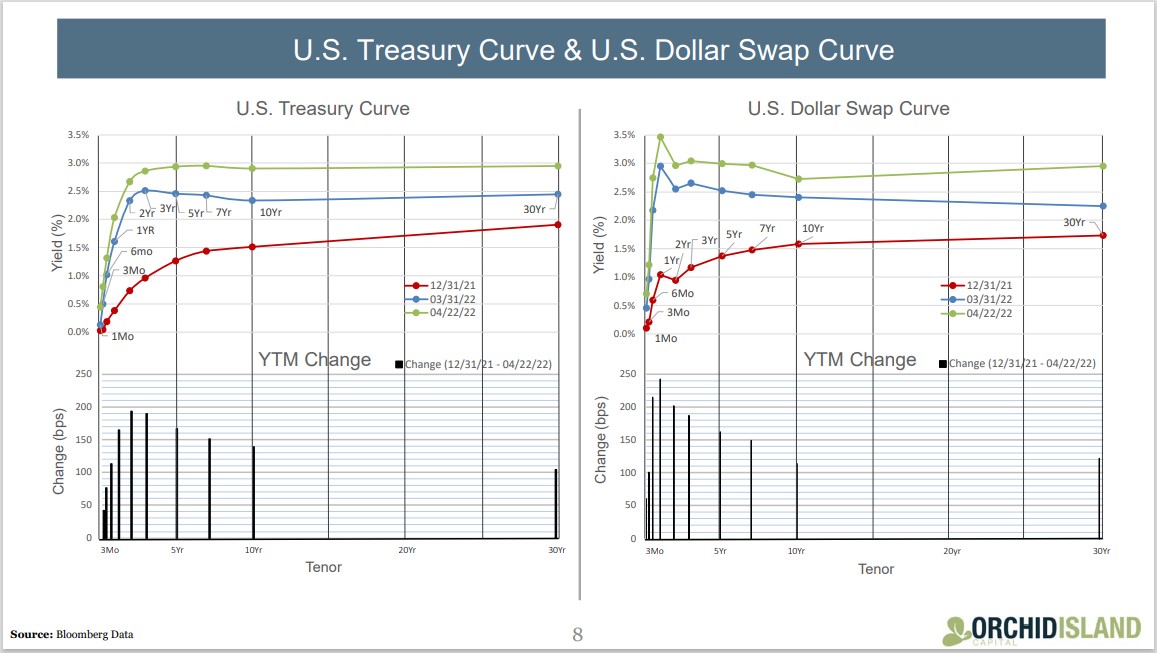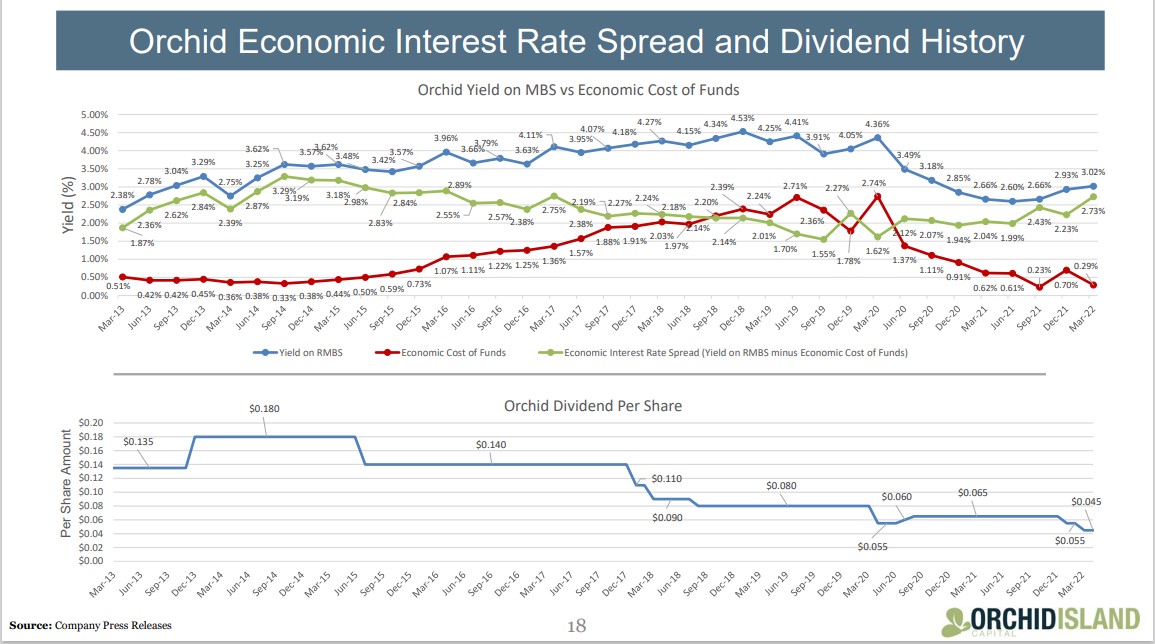First Published on July 19th, 2022 by Bob Ciura for SureDividend.
Investors are likely familiar with the standard Real Estate Investment Trusts, or REITs. Most REITs own physical real estate, lease the properties to tenants, and derive rental income which is used to pay dividends.
But there is a different set of REITs that investors may not be as familiar with: mortgage REITs. These REITs do not own physical properties, but rather buy mortgage securities.
Mortgage REITs typically have much higher dividend yields than standard REITs, but this does not necessarily make them better investments.
For example, Orchid Island Capital (ORC) is a mortgage REIT, with an extremely high dividend yield of 18.2%. Orchid Island pays dividends each month, which gives it the compelling combination of a a high yield with monthly dividend payments. It is one of the 50 monthly dividend stocks.
You can download our full Excel spreadsheet of all monthly dividend stocks(along with metrics that matter like dividend yield and payout ratio) by clicking on the link below:
Click here to download your free spreadsheet of all 53 monthly dividend stocks now.
Orchid Island has an exceptionally high dividend yield and is one of the highest-yielding stocks that we cover.
However, the outlook for mortgage REITs is challenged, and Orchid Island’s dividend yield may still not be sustainable even after multiple dividend cutsin the past several years.
This article will discuss why income investors should not be lured by Orchid Island’s extremely high dividend yield.
Business Overview
Whereas traditional REITs own a portfolio of properties, mortgage REITs are purely financial entities. Orchid Island is an externally-managed, specialty finance company. Orchid Island invests in residential mortgage-backed securities, either pass-through or structured agency RMBSs.

Source: Investor Presentation
An RMBS is a debt instrument that collects cash flows, based on residential loans such as mortgages, home-equity loans, and subprime mortgages. Mortgage-backed securities are an investment product representing a basket of pooled loans.
As investors saw first-hand during the 2008 financial crisis, mortgage-backed securities can be highly volatile and risky. That said, mortgage REITs were among the biggest winners as interest rates were falling during the aftermath of the Great Recession.
Growth Prospects
Mortgage REITs make money by borrowing at short-term rates, lending at long-term rates, and pocketing the difference, or the spread between the two.
When the spread between short-term rates and long-term rates compresses, profitability erodes. This is why mortgage REITs can be dangerous if short-term interest rates are about to increase.
Interest rates are increasing, and likely will continue to rise in the coming year. Because of this, the stock price for ORC has fallen 36% year to date.
Orchid Island has not been able to produce meaningful growth in the past several years. The company has experienced extreme earnings volatility over the past several years, with a net loss in 2013 and 2018, along with multiple years in which the trust barely generated a profit.
Orchid Island’s inability to perform well with interest rates at zero makes it unlikely that the trust can regain its footing as interest rates started to rise.
On April 28th, 2022 Orchid Island Capital reported Q1 results. The company reported a Q1 net loss of $148.7 million. Net interest income increased to $39.2 million from $24.9 million year-over-year. Total expenses stood at $4.7 million. Moreover, net realized and unrealized losses stood at $183.2 million on RMBS and derivative instruments, including net interest expense on interest rate swaps.
Meanwhile, Q1 total return stood at (19.5%) while book value per common share stood at $3.34. The company also reported net portfolio loss of $144.03 million compared to $25.88 million net portfolio loss in the year-ago period. Finally, Orchid Island Capital had $0.155 per common share of total dividends declared and paid in Q1
Dividend Analysis
Orchid Island’s eroding fundamentals have caused a significant drop in its dividend payments to shareholders in the past several years.
Orchid Island currently pays a monthly dividend of $0.045 per share, which is 30% lower than the same monthly payout level from one year ago. It also decreased its dividend earlier this year. Thus, the company has had two dividend cuts this year. Orchid Island’s dividend payout still remains below the $0.08 per share monthly dividend it was paying in early 2020.

Source: Investor Presentation
Looking back further, Orchid Island’s monthly dividend payout reached a high of $0.18 per share in 2014, but has been reduced multiple times since then.
On an annualized basis, the trust has a current dividend payout of $0.54 per share. Based on its recent closing price, the stock offers an 18.2% dividend yield. This is a huge dividend yield, considering the average dividend yield of the S&P 500 Index is currently 1.6%.
However, there are too many red flags for Orchid Island to be considered an attractive investment, including the trust’s multiple dividend cuts over the past few years and inconsistent profitability in that time.
In addition, Orchid Island has issued shares at a high pace in recent years. While the trust reduced its shares outstanding 7.4% in 2018, Orchid Island’s share count has skyrocketed since 2013. This comes at a steep cost to shareholders, in the form of heavy dilution.
With a volatile dividend history, Orchid Island is not an appealing choice for investors looking for steady dividend payouts from year to year.
Orchid Island stock appears to be the definition of a yield trap. While the stock’s consistently high yield may lure income investors, total annualized returns in the past 5 years have been negative 8.5%, even when including dividend payments.
The stock has badly lagged the S&P 500 Index, and we believe this underperformance is likely to continue.
Final Thoughts
Sky-high dividend yields can be deceiving. Orchid Island’s 18.2% dividend yield is enticing, but this stock has all the makings of a yield trap.
The trust has a sizable amount of debt on the balance sheet, and is issuing shares at an alarming pace. The outlook for mortgage REITs has improved in recent years due to low-interest rates, but this is now changing as the FED will be increasing the interest rates. However, Orchid Island’s performance remained poor during the low-interest rates environment. The trust’s most recent quarter showed improvement in net interest income, but a decline in per-share book value.
Orchid Island has cut its dividend several times in the past few years due to poor fundamental performance. Investors should tread very carefully with mortgage REITs like Orchid Island. As a result, income investors would be better served buying higher-quality dividend stocks, with more sustainable payouts.
This article was first published by Bob Ciura for Sure Dividend
Sure dividend helps individual investors build high-quality dividend growth portfolios for the long run. The goal is financial freedom through an investment portfolio that pays rising dividend income over time. To this end, Sure Dividend provides a great deal of free information.
Related:
Warren Buffett Stocks: Snowflake Inc.
Warren Buffett Stocks: T-Mobile US Inc.




